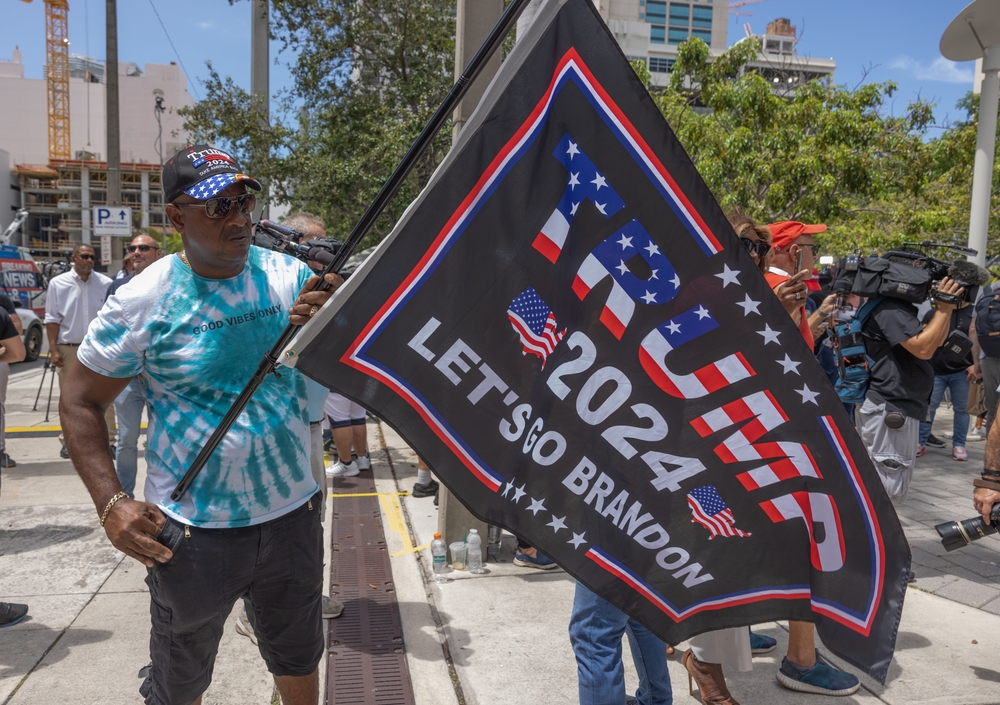For the past two and a half years, Republicans have used the phrase “Let’s Go Brandon” as shorthand for a profane phrase that begins with an “F” and ends with the president’s name.
The phenomenon witnessed two different “Let’s Go Brandon” songs cracking Billboard’s Top 40, South Carolina congressman Jeff Duncan wearing a COVID mask bearing the phrase on the floor of the House of Representatives, and countless flags, bumper stickers, and T-shirts.
Before Christmas, Joe Biden’s campaign compared his political adversary to the leader of the Third Reich. “TRUMP PARROTS HITLER,” a crude graphic released by his campaign informed.
In February, Biden described his Republican opponents in the House of Representatives as worse than the segregationists.
“I’ve served with real racists,” he told a San Francisco audience of high-dollar donors. “I’ve served with Strom Thurmond. I’ve served with all these guys that have set terrible records on race. But guess what? These guys are worse.”
All of that, and the fact that Senator Biden delivered a eulogy for Senator Thurmond, called Senator John Stennis his friend, and repeatedly voted for a former Exalted Cyclops of the Ku Klux Klan (Robert Byrd) as his party’s leader in Congress’ upper chamber, illustrates that “agree to disagree” and other guidelines for civility that formerly influenced behavior in the U.S. Senate and beyond no longer guide.
Into this coarse and divided America comes Michael Hassell’s Deep Tradeoffs: Restoring Balance and Respect in a Polarized, Angry World. The author borrows a concept popular in economics as the means to alleviate what ails the world of politics. Tradeoffs indicate an exchange in which the parties sacrifice goods to obtain some greater good. Hassell urges Americans to pursue such a course to achieve a more civil and tolerant national conversation. He calls his book “an invitation to debate and reflect—NOT essays on what to think, or who to fight.”
How did this corrosive problem morph into an existential threat (short of some reversal) that plagues the United States in 2024 in a way that 1984’s Joe Biden—a friend of Senator Stennis—could not foresee?
Hassell concedes that some baleful influences come baked into the system, such as the adversarial aspect of the legal system and the “us vs. them” binary choices that greet American voters. But these predate the present nastiness, so something greater seems at work.
What makes 2024 lean more 1968 and 1860 than 1984 and 1924?
The author cites the tendency among the political class to push big “solutions” to individual and widespread problems as one way that political tensions rise. He notes that “the bigger the stakes are, and the more centralized and universal the proposed solution may be, the nastier the fight.” Indeed, citizens generally do not seethe over allocations for this bridge or that tunnel. But when politicians seek such ambitious goals as altering the climate or remodeling the healthcare system, the fights tend to grow more caustic as the price tag’s digits grow. The increasing indifference toward winning over members of the opposing party in these legislative battles, one surmises, both stems from and compounds the problem.
The peculiar shift from the days of hucksters inflating their social class (think Martin Chuzzlewit’s Montague Tigg rechristening himself Tigg Montague) to a large segment of the population emphasizing or exaggerating some aspect of their background that awards them cause for grievance—to the point that a not statistically insignificant portion of the population simply manufactures ethnicity, sex, poverty, or sexuality—highlights the uses of victimhood.
“It’s worth noting here that political controversies powerfully enter the experience of people who identify as victims of injustice,” Deep Tradeoffs points out. Further:
Feeling aggrieved, convinced that you’re harmed or violated, is not a promising way to develop a calm, patient approach to managing conflicts. Our victim-oriented culture, with competitive debates over who is most damaged, provides grand opportunities for politicians to declare unbounded commitment to right society’s wrongs. The wrongs may be real or imagined; all are likely to be highly magnified by power-seeking saviors.
In a related sense, cancel culture—unpersoning individuals whose transgressions run from gross violations of other human beings to merely rubbing raw in-crowd political sensitivities—creates a far more Manichean society in its rigidity, gracelessness, and lack of forgiveness. Yet not every bit of news is bad for those wishing to restore a more tolerant and civil national conversation. The recent, redemptive Saturday Night Live hosting gig of Shane Gillis, fired from the program in 2019 four days after his hiring as a result of a pressure campaign objecting to politically incorrect jokes, strikes as one of many signs of the phenomenon’s waning power.
In hopes of moving the culture even further in Thermidor’s direction, Deep Tradeoffs proffers a number of suggestions aimed at fostering a healthier approach to political difference.
The book suggests describing political opponents in terms they themselves might find acceptable, where appropriate adding “debunked” or “false” to internet searches on ideas one seeks to affirm to avoid confirmation bias, and conversing with those of opposing views not with an aim to convert or humiliate but to listen and generate questioning through trust and a spirit of love.
Among the issues I had with the book: rather than using quotations or aphorisms as chapter-starting epigraphs, he uses them to separate paragraphs without context, undermining the flow of the text itself. And there was one glaring change to American life left unconsidered within Deep Tradeoff’s pages, a causal factor negatively altering the relationship of the individual toward politics. In the 1950s and ’60s, 98% of Americans believed in God, according to Gallup. Now the pollster, after finding the number dipping to 81% in 2022, reports in a more recent poll that just 74% believe in a Supreme Being. This corresponds to a decline in active participation in houses of worship; the Public Religion Research Institute reports that less than half of Americans attend religious services a “few” times a year. On the left, this corresponds to the faithless making a religion of their politics. On the right, it means the faithful make a politics of their religion. This all adds up to more zealots, heretics, sins, and devil-figures inhabiting the political plane.
I believe the reader will accept such defects as fair tradeoffs for what works in the book overall. Deep Tradeoffs fits the moment, and Michael Hassell addresses it with a breadth of knowledge that relies on much of the best that has been thought and said within an array of disciplines. Perhaps the book’s greatest attribute comes in the author’s admission that disagreement and disagreeableness will remain no matter what, and to the degree that positive change comes, it will do so through individuals modifying their own behavior to serve as a contagious example to others. The author convinces on this point by neither thumping on tables nor breathlessly raising his voice—and, yes, many authors betray these bad habits on the printed page—but instead by writing in a calm, measured way befitting his subject. Yet one suspects that, however timely and necessary the book, readers attracted to it the most need to read it the least, and those who potentially would benefit from it the most will likely never pick it up. But the author cannot be faulted for that.
“Maybe our ultimate goal can become not necessarily victory,” Michael Hassell writes of political arguments, “but some reconciliation with others.”

